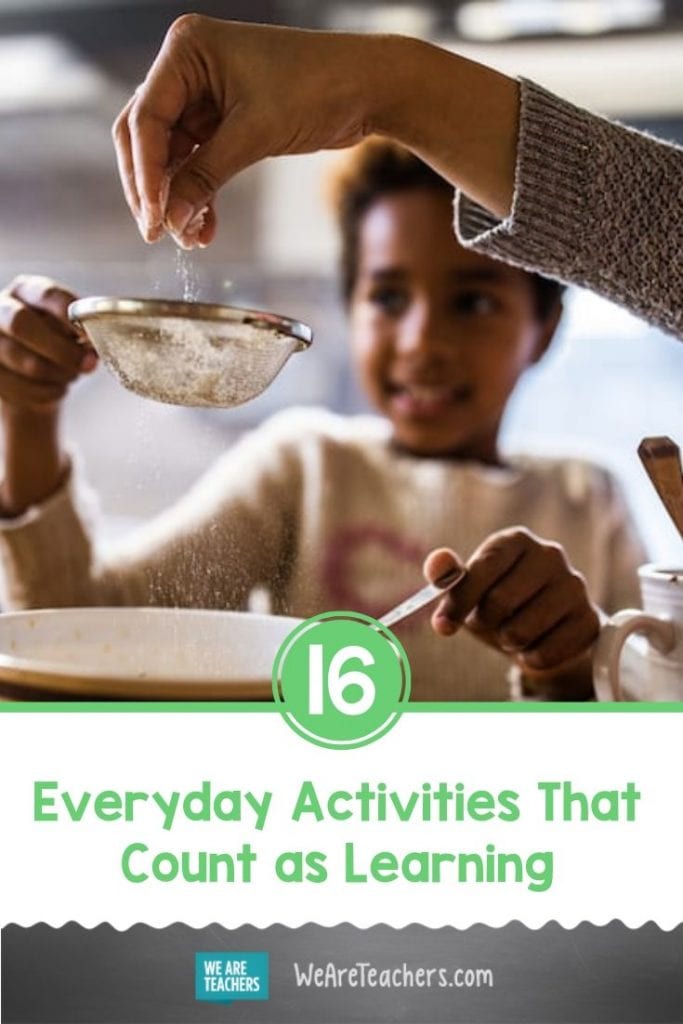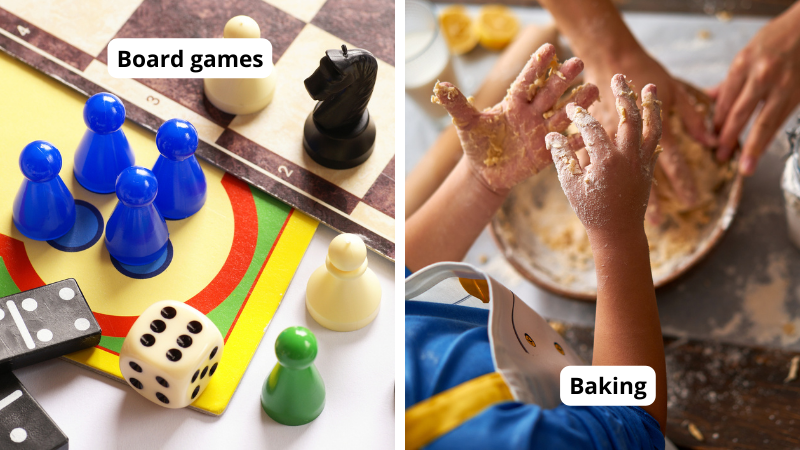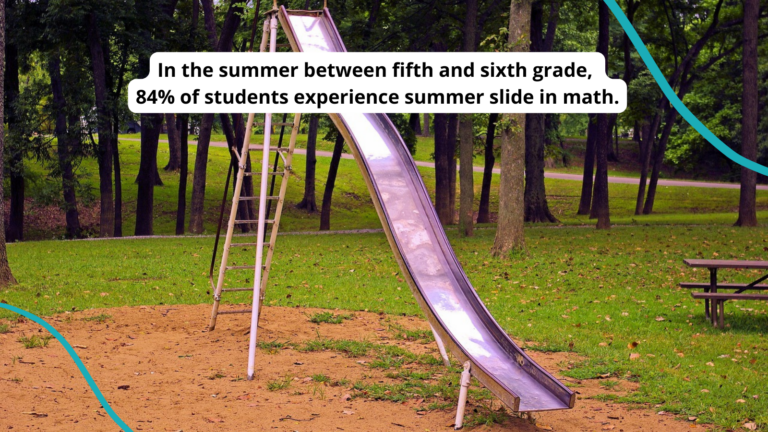More and more, it seems like requirements like homework and summer packets are becoming an unreasonable ask of families. (And maybe they always have been.) But how much do those kinds of assignments really matter? I’d venture to say not that much. I think we’d be better served by encouraging a variety of everyday activities that are 1)more likely to happen and 2)have learning benefits. These kinds of activities have their limits (kids aren’t going to learn calculus from cooking dinner), but overall, you can feel good about kids furthering their learning through these at-home activities.
Cooking and baking
There are a variety of subjects to be learned in the kitchen. There’s the practical skills of being able to prepare a meal for yourself or your family, but there is plenty of academic content involved as well, like math, science, and vocabulary. Little ones can practice counting, sequencing, measuring, and even build their fine motor skills. Older students can work on fractions, conversions, and chemistry (from boiling points to the yeast’s reaction with sugar).
Meal planning
Before heading to the grocery store, kids can plan a menu and create a shopping list. They’re learning responsibility, sure, but they’re also getting quite a bit of math. For example, they may need to convert a recipe that feeds four to one that feeds their family of six. Integrate nutrition by requiring each meal to have a protein, whole grain, and vegetable. You can also give them a budget and have them place an online grocery order.
[contextly_auto_sidebar]
Budgeting
Speaking of budgets, it’s always a good time to incorporate some financial literacy into at-home learning. Young children can try the “three jars” method: one for saving, one for spending, and one for sharing (have them pick a cause that’s important to them). Kids with allowances and teens with income from a job should do some simple budgeting. Apps like Mint are pretty user-friendly.
Checking the weather forecast
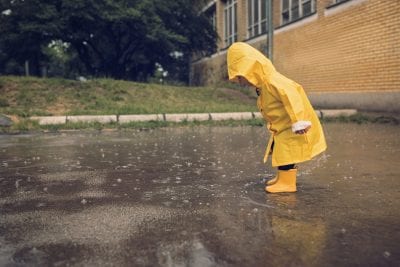
For easy early statistics instruction, look no further than the weather app on your phone or your local news station. Talk to kids about predictions based on data and how meteorologists forecast the weather. Have them look up weather phenomena they hear about and words they don’t know. Extend the learning by having kids create their own weather journal.
Building with LEGO
LEGO bricks have STEM written all over them. Kids who build with LEGO sets learn to use basic materials to complete a task. And following those directions is no easy feat! They can even come up with their own ideas (a bridge! a skyscraper!) and use engineering concepts to bring it to life. LEGO bricks can also be used to teach all kinds of math concepts.
Playing card games
Card games can help children learn everything from arithmetic and shape recognition to strategy and social skills. Many card games require serious critical thinking. Our favorites for the younger set include memory, old maid, and go fish. Older kids can learn more complicated games, such as rummy or pinochle.
Playing board games
Board games have all kinds of benefits, such as learning the art of losing and winning gracefully, but they’re also a great brain booster. Games like Chutes and Ladders and Candyland help our youngest learners with one-to-one correspondence. For kids struggling with language, games like Scrabble and Boggle can provide much-needed practice. Strategy games such as Settlers of Catan, Risk, and (of course) chess, get that frontal cortex working.
Doing puzzles
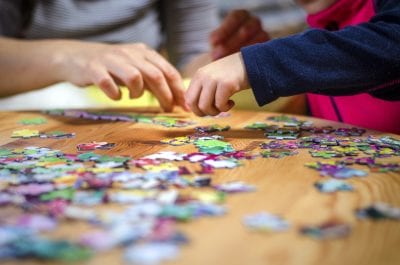
Puzzles are a fun challenge and an incredible educational tool. Those big, chunky puzzles for little ones build hand-eye coordination, small muscle control, and spatial awareness. Jigsaw puzzles can help older kids with spatial reasoning and problem-solving. Because they require so much attention to detail, they can also promote a longer attention span.
Imaginative play
There’s no such thing as “just” playing. All play is learning. Imaginative play, such as dress-up, doll play, and role play, promotes creativity and emotional, social, and language development. And those skills are precursors to academic learning. Big kids can get in on the action (and benefits), too, with highly involved role-play games like Dungeons & Dragons.
Listening to music
Music just makes everyone happier, but it’s more than a dose of feel-good medicine (although, frankly, that should be reason enough). Research shows that pleasurable music is able to influence task performance . To get the full benefits of music, go beyond just listening and try singing along, dancing, and/or clapping. In other words, you have full dance party permission.
Reading
There’s no such thing as too much reading. Let kids read whatever they want: picture books, magazines, graphic novels, even nutrition labels. Why? Because the amount of free reading done outside of school is positively correlated with growth in vocabulary, reading comprehension, and fluency.
Coloring, drawing, painting
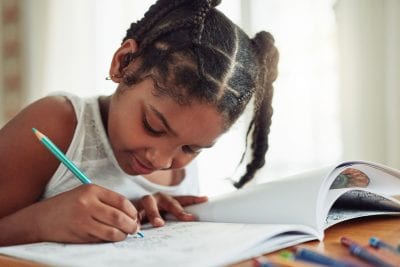
Trending adult coloring books tell us everything we need to know about the healing power of coloring. It’s a great de-stressor for kids, too. On top of that, it improves motor skills and spatial awareness. Drawing and painting foster creativity at the same time they teach concepts like line, shapes, colors, perspective, and forms.
Listening to podcasts or audiobooks
Podcasts and audiobooks stimulate kids’ imaginations (because there’s no visual component) and can even improve their reading skills (listening while reading along can help with decoding). There are tons of entertaining podcasts for kids with an educational bent. Check out our list of best podcasts for kids.
Writing letters or emails
Composing letters or emails is a great way to teach the mechanics of writing. Kids have to be thoughtful, plan out what they want to say, and figure out the best way to communicate that. Spelling and grammar must be correct for the recipient to understand.
Taking a walk
Learning to take care of one’s physical self is a critical part of any child’s education. Taking a walk keeps kids healthy in both body and mind. If you want to make the experience more educational, make it a nature walk and have kids document their observations.
Cleaning and doing chores
Participating in housework teaches those all-important life skills that will help kids to grow into independent adults. It also builds a strong work ethic and time management skills. When kids have to figure out how to fit the dishes in the dishwasher or sort socks, they engage in problem-solving.
For more articles like this, subscribe to our newsletters!
